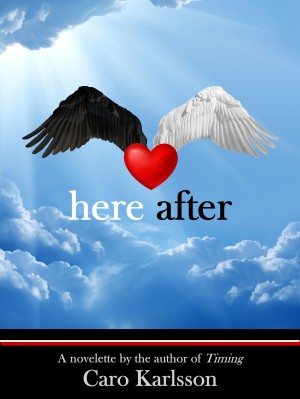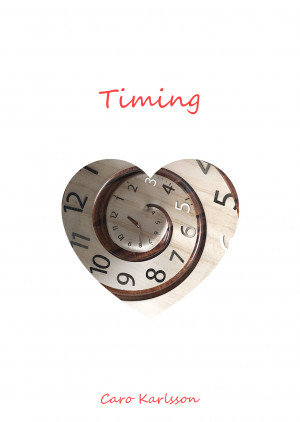Interview with Caro Karlsson
Published 2020-03-19.
What motivated you to become an indie author?
I am a fairly goal-oriented person. So when I decided to write "Timing" I knew I would have to complete it through to the point of publishing. During the writing of the novel, I was working two jobs and also regularly volunteering my personal time to two local organizations. There was a point when I realized that I was going to have a completed novel on my hands which would be bound to languish in my personal files if I could not find the bandwidth to pursue the traditional publishing route of sending out queries to appropriate publishing houses, and possibly finding a literary agent. Also, I wanted my "second life" as a writer to begin as soon as possible. Having an opportunity to self-publish allowed me to expedite the road to publication and accomplish my goal of authorship.
Where do you find inspiration for your stories, and what are you working on next?
My stories generally begin with a simple idea that I find myself daydreaming about until I have a plot to pursue. For "Timing," I wondered what it would be like to be a twenty-something time traveling against one's will, and then compounded it with characters dealing with modern problems in historical settings. I have recently completed a novelette called "Here After." Like "Timing," it is a love story at its core--a fallen angel who attempts to avoid falling in love. I'm currently working on the sequel to "Here After".
Without spoiling the plot, it could be said that Timing incorporates some dark themes. Why explore these themes in a time travel setting?
I think of "Timing" as a statement on quarter-life crisis during the 1990s -- before the phrase "quarter-life crisis" was really even used. The characters in this story are young adults dealing with many of the uncertainties of growing older -- being responsible for their own actions, respecting not only friends and family, but also strangers, and finding out what they want to be when they grow up. Young people handle societal pressures in myriad ways, and when the main characters of "Timing" must do so in the midst of a time travel experiment, it is interesting to see how they handle themselves.
What do you read for pleasure?
As an adolescent, I followed in the footsteps of my family's matriarchs and read a lot of romance novels. Judith McNaught's "Once and Always" almost ended that behavior for me. I have read that book over and over again throughout the years, and I truly cannot imagine a more interesting hero and heroine to root for. That book has it all, and I will always be in love with Lord Jason Fielding, even if Victoria Seaton won his heart long ago. (I always picture Christopher Plummer as the uncle.) Shortly after reading that book for the first time, I started to read novels like those of John Grisham, and some mystery series. For the most part I stick to stories with a lot of action, and I really like Dan Brown's and Brad Meltzer's novels.
When did you first start writing?
I was very shy around strangers a youngster, but I found I could get my feelings out through writing poems and short stories. Also, I was lucky enough to grow up in an era when it was popular to hand write letters to friends and pen pals (including pen friends in England, Japan and Kenya!). I believe these experiences gave me a strong appreciation for the written word. So, I've basically always considered myself a writer of some kind. Writing a novel was something I had always wanted to do, but was not sure I really had the discipline to do. I was glad to prove myself wrong when I published "Timing".
What is your writing process?
I have to be in the mood to write, and when that mood hits I usually go off the grid as much as possible. I will turn off the phone and decline invitations when I feel I am on a roll. Conversely, when I am not in the mood to write, I try not to worry about it. During those times, I am usually exhibiting my creativity in some other mode -- cleaning the house, crafting, gardening. Okay, I know those activities may sound like work, but truthfully, they're the types of activities that free my mind to wandering, and that can really inspire my imagination. When I hit on an idea, I can go right back to hunkering down with a new chapter or story.
Where did you grow up, and how did this influence your writing?
As a Navy "brat", my family lived in several US states while I was growing up. The experience provided great exposure to a variety of landscapes, community cultures, and friendship opportunities. Despite a dislike for packing and unpacking, I believe those earlier experiences moving from place to place gave me the travel bug, which in turn indicated a career direction when I came out of college.
How has Smashwords contributed to your success?
Smashwords has given me an outlet for my writing, plain and simple. Being able to get my novels in front of readers in multiple formats has given me a great sense of accomplishment. Knowing that I can build a relationship with readers through Smashwords also provides impetus to pursue additional writing goals. That is, with other works in progress, I do not need to fret over decisions about how and when to publish. Having Smashwords as an option takes the pressure off of the process and allows me to focus on being creative.
Smashwords Interviews are created by the profiled author or publisher.
Books by This Author
Here After
by Caro Karlsson
A powerful demon. An earthbound female. An angelic godmother. How much faith will it take for a fallen angel to be with the woman he loves?
Timing
by Caro Karlsson
Emma Waits' name says it all. She's been pining for Curtis Helm for nearly her entire college career. But when a computer lab accident occurs under his supervision, she'll find out if her heart can withstand the test of time travel.


